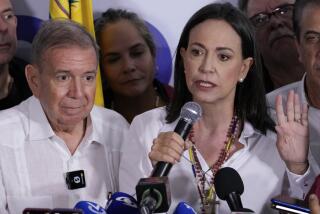Reaffirming Support, Clinton Says Yeltsin Had to Use Force : Reaction: President tells labor leaders ‘tough action’ was required. He adds that his backing is based on Russian’s promise to hold elections.
- Share via
SAN FRANCISCO — President Clinton said Monday that he “stands firm” behind Russian President Boris N. Yeltsin, contending that the Russian leader had no alternative but to use force after his opponents began attacking government buildings.
“The United States continues to stand firm in its support of President Yeltsin because he is Russia’s democratically elected leader,” Clinton told the AFL-CIO annual convention here. “We very much regret the loss of life in Moscow, but it is clear that the opposition forces started a conflict and that President Yeltsin had no other alternative than to try to restore order.”
Clinton later told reporters: “I don’t see that he had any choice. . . . If such a thing happened in the United States, you would have expected me to take tough action against it.”
But Clinton, in a gentle message to Moscow, added that his support for Yeltsin is based on the Russian’s pledge that there will be new parliamentary elections in December.
“As long as he goes forward with the new constitution, genuinely democratic elections for the Parliament, genuinely democratic elections for the president, then he is doing what he said he would do,” Clinton said.
Asked about reports that Yeltsin had banned several opposition parties and closed several newspapers, officials said the actions did not shake the Administration’s support.
One official called the reports “a matter of concern.” But a White House aide, asked if Yeltsin had risked losing U.S. backing, said, “If there is a line, we’re not there yet.”
Instead, the mood among Clinton aides was one of relief that Yeltsin had triumphed, after a weekend of worrying that he might have waited too long and ceded political momentum to his anti-reform, anti-Western opponents.
“The United States is obviously very relieved,” Strobe Talbott, Clinton’s top adviser on Russian affairs, told reporters.
U.S. officials were acutely aware that Yeltsin’s chief opponent, Vice President Alexander V. Rutskoi, whom the Russian president fired Sunday, is a fiercely anti-American nationalist who has called for a reconquering of neighboring lands that were part of the Soviet Union before 1992.
Clinton said repeatedly that Yeltsin had “bent over backwards” to avoid using force and noted that the opposition rioters had “abused” government forces under orders not to fire.
“If you look at what happened, they broke through a police line that was not as well armed as the opponents and not as willing to use force as the opponents and things got out of hand,” he said.
Talbott added that U.S. officials were impressed by the Russians’ efforts to use “only that degree of force that was absolutely necessary . . . to end the outburst of violence.”
A senior White House official said that Yeltsin did not notify the United States of his intention to use force against the opposition leaders and that the United States gave no advice. “There was no green light, red light or yellow light,” he said.
But Talbott was in touch with the Russian ambassador in Washington, Vladimir P. Lukin, and the U.S. ambassador in Moscow, Thomas R. Pickering, throughout the siege. He also met with Russian Foreign Minister Andrei V. Kozyrev, who ended a weeklong visit to the United States and left for Moscow on Sunday night, just before Yeltsin’s troops attacked the Parliament building.
“I was in contact with a fairly high-up official of the Russian government in the wee hours of (Monday) morning who told me that basically the Yeltsin government had two options,” Talbott said. “They had a ‘quick and dirty’ option, which would have meant basically going in like gangbusters and a great deal more people would have ended up dead, or they could try to do it piecemeal and do it one floor at a time, one room at a time, and try to see how many people they could get to come out peacefully and alive.”
Talbott said that the United States did not offer any advice on the choice.
“We have not at any point been in the position of offering advice to President Yeltsin on how to manage the extraordinarily complex political life of his country,” he said. “First of all, we don’t feel that that would be appropriate and, second, we don’t feel that he needs our advice. I think he has demonstrated leadership and skill throughout.”
White House aides said that there had been no direct communication between Clinton and Yeltsin during the crisis. The White House was attempting to get a call through to Yeltsin, one official said, “but he is very busy.”
However, Kozyrev telephoned Secretary of State Warren Christopher from Moscow on Monday and told him that Yeltsin plans to reaffirm his schedule for new parliamentary elections in December, Christopher said--”in short, to give reassurances that he is still on a democratic course.”
Christopher said that he intends to go ahead with a planned trip to Moscow late this month. Only a day before, the State Department had issued a formal warning against travel to the Russian capital.
McManus reported from Washington and Lauter from San Francisco.
More to Read
Get the L.A. Times Politics newsletter
Deeply reported insights into legislation, politics and policy from Sacramento, Washington and beyond. In your inbox twice per week.
You may occasionally receive promotional content from the Los Angeles Times.












